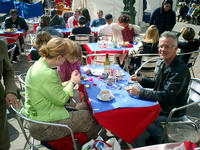|
This is my dynamic, frequently updated homepage. This is a NewsLog, also known as a WebLog or Blog.
Everything is evolving, so don't assume too much.
People to watch:
Adina Levin
Andrius Kulikauskas
Britt Blaser
Catherine Austin Fitts
Chris Corrigan
Clay Shirky
Dan Gillmor
Dave Pollard
David Allen
David Weinberger
Dewayne Mikkelson
Dina Mehta
Doc Searls
Elisabet Sahtouris
Elizabeth Lawley
Euan Semple
Florian Brody
Frank Patrick
Gen Kenai
George Dafermos
George Por
Graham Hancock
Greg Elin
Hazel Henderson
Heiner Benking
Inspector Lohman
Jean Houston
Jerry Michalski
Jim McGee
Jim Moore
John Abbe
John Perry Barlow
John Robb
Joi Ito
Jon Husband
Jon Lebkowsky
Jon Udell
Jonathan Peterson
Judith Meskill
Julian Elvé
Julie Solheim
Kevin Marks
Lawrence Lessig
Leif Smith
Letecia Layson
Lilia Efimova
Lisa Rein
Marc Canter
Mark Oeltjenbruns
Mark Pilgrim
Mark Woods
Martin Dugage
Martin Roell
Mary Forest
Matt Mower
Max Sandor
Michael Fagan
Mike Owens
Mikel Maron
Mitch Kapor
Mitch Ratcliffe
Nathalie dArbeloff
Netron
Noam Chomsky
Paul Hughes
Peter Kaminski
Phil Wolff
Philippe Beaudoin
Ray Ozzie
Raymond Powers
Rebecca Blood
Roger Eaton
Roland Tanglao
Ross Mayfield
Scott Lemon
Sebastian Fiedler
Sebastien Paquet
Skip Lancaster
Spike Hall
Steven Johnson
Stuart Henshall
Thomas Burg
Thomas Madsen-Mygdal
Thomas Nicholls
Timothy Wilken
Todd Suomela
Tom Atlee
Tom Munnecke
Tom Tomorrow
Ton Zijlstra
Lionel Bruel
Loic Le Meur
Nancy White
Mark Frazier
Merlin Silk
Robert Paterson
Colby Stuart
Nova Spivack
Dan Brickley
Ariane Kiss
Vanessa Miemis
Bernd Nurnberger
Sites to watch:
Edge
Junto
Absara
Rhizome
Nanodot
HeadMap
Openworld
FutureHi
Imaginify
Do No Harm
BoingBoing
Smart Mobs
Webcamorama
MetaFilter
NotThisBody
Disinfopedia
YES Magazine
Collective Web
WorldChanging
Disinformation
Escape Velocity
Space Collective
Friendly Favors
Emergent by Design
Independent Media
Global Ideas Bank
Forbidden Science
Greater Democracy
ThoughtsOnThinking
Disclosure Project
Explorers Foundation
Manufacturing Dissent
Collective Intelligence
Action without borders
Free Expression Network
Co-intelligence Institute
Electronic Frontier Foundation
French:
Emmanuelle
Manur
Elanceur
Loeil de Mouche
IokanaaN
Blog d'Or
Le Petit Calepin
GeeBlog
Absara
Guillaume Beuvelot
Ming Chau
Serge Levan
Jean Michel Billaut
C'est pas Mécanique

I live in Toulouse, France where the time now is:
01:06
Unique Readers:

Primarily
Public Domain
Everything I've written here is dedicated to the
Public Domain.

The quotes from other people's writings, and the pictures used might or might not be copyrighted, but are considered fair use. Thus, overall, this weblog could best be described as being:
Primarily Public Domain. |
Syndication:
 ![Validate my RSS feed [Valid RSS]](http://www.newciv.org/pic/valid-rss.png)
|
| Tuesday, April 1, 2003 |  |
|
|
|
 Seb mentions Peter Tesugen analyzing Edward de Bono's principles of simplicity, from his book "Simplicity". These are the principles: Seb mentions Peter Tesugen analyzing Edward de Bono's principles of simplicity, from his book "Simplicity". These are the principles:1. You need to put a very high value on simplicity
2. You must be determined to seek simplicity
3. You need to understand the matter very well
4. You need to design alternatives and possibilities
5. You need to challenge and discard existing elements
6. You need to be prepared to start over again
7. You need to use concepts
8. You may need to break things down into smaller units
9. You need to be prepared to trade off other things for simplicity
10. You need to know for whose sake the simplicity is being designed
Peter has a good discussion about what the less obvious points are about.
[ Patterns | 2003-04-01 00:29 | | PermaLink ] More >
|
|
| Monday, March 31, 2003 |  |
|
|
|
 Marshall Sahlins is the author of Stone-Age Economics, which is an interesting read, in part about gift economies and how pre-historic economic systems weren't as miserable as they're commonly believed to be. Here is something from the article The Original Affluent Society: Marshall Sahlins is the author of Stone-Age Economics, which is an interesting read, in part about gift economies and how pre-historic economic systems weren't as miserable as they're commonly believed to be. Here is something from the article The Original Affluent Society:"There are two possible courses to affluence. Wants may be "easily satisfied" either by producing much or desiring little The familiar conception, the Galbraithean way- based on the concept of market economies- states that man's wants are great, not to say infinite, whereas his means are limited, although they can be improved. Thus, the gap between means and ends can be narrowed by industrial productivity, at least to the point that "urgent goods" become plentiful. But there is also a Zen road to affluence, which states that human material wants are finite and few, and technical means unchanging but on the whole adequate. Adopting the Zen strategy, a people can enjoy an unparalleled material plenty - with a low standard of living. That, I think, describes the hunters. And it helps explain some of their more curious economic behaviour: their "prodigality" for example- the inclination to consume at once all stocks on hand, as if they had it made. Free from market obsessions of scarcity, hunters' economic propensities may be more consistently predicated on abundance than our own." Sahlins explains how typical hunter-gatherers work 3-5 hours per day on acquiring food, and they have plenty of time for leisure. For that matter, they have a schedule that most civilized people would be sort of envious about. The more 'civilized' we become, the harder we tend to work, and the less time we have for leisure. He also makes some interesting distinctions between primitive living and poverty. In hunter-gatherer cultures starvation would be pretty much unthinkable."The world's most primitive people have few possessions. but they are not poor. Poverty is not a certain small amount of goods, nor is it just a relation between means and ends; above all it is a relation between people. Poverty is a social status. As such it is the invention of civilisation. It has grown with civilisation, at once as an invidious distinction between classes and more importantly as a tributary relation that can render agrarian peasants more susceptible to natural catastrophes than any winter camp of Alaskan Eskimo." I'm not sure what we can learn here, other than that it is possible to successfully live very simply and modestly. There must be some kind of point that applies also to a technological civilization. A just-in-time kind of thinking. We could very well arrange our world so that nobody ever has to starve and so we only work a few hours per day. From what I hear, only 2-3 percent of our work relates to actual production, and from my own observation, the majority of human work is inefficient or unnecessary, just arranged to keep people busy. So, why can't we have a an efficient and productive, but leisurely and relaxed, high tech society, where it would be unthinkable that basic needs wouldn't be filled?
[ Organization | 2003-03-31 06:18 | | PermaLink ] More >
|
|
|
|
NBC has fired veteran reporter Peter Arnett because he told Iraqi television that the U.S. war plan against Saddam Hussein had failed. In 1998 he was fired from CNN after the Pentagon complained about a documentary he did on how the U.S. used Sarin gas on American defectors in Laos. And Arnett both times apologized and sort of withdrew what he said. Would be better if he just stuck with the truth he said in the first place, I think.
[ News | 2003-03-31 08:51 | 0 comments | PermaLink ]
|
|
|
|
The head of Indonesia's highest legislative body today urged the United Nations to bring George W Bush and Tony Blair before a war crimes tribunal for launching the war against Iraq. Yeah, that would be a good thing. But probably not likely unless they mess up much more badly.
[ News | 2003-03-31 09:02 | | PermaLink ] More >
|
|
|
|
BitTorrent is a new peer-to-peer distribution mechanism for large data files. It makes it possible to share a file without being bogged down with traffic if it happens to become popular. Each person who downloads it becomes a new source of it. Files are both uploaded and downloaded to many places at the same time. See an introduction here on Slashdot. There's apparently not any snazzy graphical interface to it yet, so it still mostly for techies.
[ Technology | 2003-03-31 12:46 | 0 comments | PermaLink ]
|
|
|
|
 Scientists have discovered a way of recognizing the signs of life in rock formations. Essentially: create a digital image of the rock; then compress the image file. The more the file shrinks, the more likely it is that life was responsible for building the layers. Scientists have discovered a way of recognizing the signs of life in rock formations. Essentially: create a digital image of the rock; then compress the image file. The more the file shrinks, the more likely it is that life was responsible for building the layers.Although biological stromatolites and non-biological stromatolite-look-alike structures appear similar to the human eye, the biological origin of stromatolites makes them more ordered, more highly patterned. And it is this patterning that, while hard for the human eye to discern, is readily detected by the compression algorithm. Non-biological stromatolite-like structures are more random, less patterned and therefore less compressible. An online test is here. Hm, interesting. Is higher life forms more or less compressible? Would the ultimate life forms be the most compressible and embeddable? Does all of life reduce to a beautiful little formula?
[ Nature | 2003-03-31 13:26 | | PermaLink ] More >
|
|
| Sunday, March 30, 2003 |  |
|
|
|
 Chris Corrigan mentions how it is a bit strange when the content of a weblog suddenly changes because its author is in different circumstances. Like here I'm for a couple of weeks vacationing in Europe. My weblog looks the same on the surface, but suddenly I'm just writing about little towns in France instead of about systems and technology and the world situation. Chris Corrigan mentions how it is a bit strange when the content of a weblog suddenly changes because its author is in different circumstances. Like here I'm for a couple of weeks vacationing in Europe. My weblog looks the same on the surface, but suddenly I'm just writing about little towns in France instead of about systems and technology and the world situation.
When I'm traveling I really notice how my normal style of blogging depends on many factors than I normally don't think much about, and how I'm sort of lacking a format for blogging what I'm actually doing.
Typically I work at my computer many hours per day and quite naturally I browse a lot of information sources, so I can maintain a certain overview. And I seem to have peace and quiet to sit and philosophize about things, and it seems natural to talk about self-organization or alternative economic systems or other meta subjects. And I don't have a great urge to talk about my physical environment or what I actually do each day.
But if for example I travel, my mind is more on where my suitcases are, on what I'm getting for dinner, who I'm meeting, and how it looks where I am. Very different thing. Much more sensory input, but less abstract input, and much less chance to sit quietly and talk about any of it.
When I'm on the move, what I could use would probably be a simple mob-log technology, where I could post photos and short notes from a cell phone or something. And probably I'd prefer for that to go in a sidebar to my normal weblog.
It is obvious that there are different styles of weblogging. For some people it is simply recording what they do and think each day, and what they have for breakfast. For some, their postings are driven by what is in the news. For some, like for me I think, there is a certain meta thread that goes through what they want to talk about, even if the pieces might be sort of haphazard, and might or might not have anything to do with the 'news'. Some people manage to find a style that brings all of it together. Doc Searls says his weblog is simply that he answers his e-mail in public. Dave Winer seems to have a style where car trips and family matters work well on equal footing with technical issues and bigger meta issues.
For some people, the ultimate of weblogging would be to have a camera attached to your head that would record everything that happened to you. For others the ideal would be a news studio or newspaper editorial office with hundreds of incoming feeds that you can select from. Others again would prefer a quiet spot away from all disturbances, where they can sit down and write about what they think, all by themselves. I suppose I'd prefer a combination of all of those.
[ Diary | 2003-03-30 03:31 | | PermaLink ] More >
|
|
|
|
 Paul Hughes does some excellent thinking about really big questions, like the possible origin of the laws of the universe. Paul Hughes does some excellent thinking about really big questions, like the possible origin of the laws of the universe."I have been engaging in some discussion lately about the begining of the universe, and for the first time (amazingly enough) I pushed the 'Where did it come from' question through as far as it can go. And, not surprisingly, it doesn't go anywhere. No matter how you try to explain the origin of the universe, none of the theories can account for the cause of it. What caused the big bang? Where did 'God' come from? etc.
From this, i concluded that there cannot be a begining. If there was a begining, then something must have caused that begining, and so something was there before the begining.
This doesn't answer anything, but I am yet to see another way around the causality problem (defining something as 'acausal' doesn't solve it, it just dodges it).
Now, linked to this 'where did the universe come from?' problem is, 'Where did the incredible laws, which make our universe a coherent place come from?', which is what I think underlies it all. Once the universe began, it is easy to say 'the laws guided the evolution of everything from there'....but how did the laws come to be? Why are they so perfect?" I wish more people would be able to discuss things like that intelligently. Many will merely, if they even try, end up with some silly circular reasoning or 'just because!' kind of answer. I'm not sure I end up in the exact same place as Paul does - that there are no fundamental laws. But then again, I agree that anything is possible, so maybe we do see it the same way. Either way, this would be a great discussion to spend a few hours on.
As Paul points out, any kind of explanation that is built on ideas such as 'that is how evolution works', or 'it is all random' or 'God created it all' or 'it all follows logically from a Big Bang' - are just sort of starting in the middle and not explaning how that arrangement came about.
The best guard against closed-minded fundamentalism, of the religious or scientific kind, would be to invite more discussions like that. And to invite more of us to be comfortable with the uncertainty you run into when you probe deeply enough into how things work.
[ Knowledge | 2003-03-30 13:54 | | PermaLink ] More >
|
|
| Saturday, March 29, 2003 |  |
|
|
|
 Britt speaks about money velocity and gift economies. Britt speaks about money velocity and gift economies."Money velocity is a big deal, but only economists talk about it. I'm no economist, but I know what I like. Money velocity measures how many times the average dollar changes hands in a year. The GDP measures all the transactions we do in a year. When we get a dollar, we spend that dollar, which gets measured as a $2 addition to the GDP. If consumers and businesses feel confident, they spend money faster and the GDP goes up and we proclaim ourselves successful, If we hang on to our dollars a little longer, we're less successful. I don't know what the current figures are, but I recall money velocity being about 12-14 times a year when I took my single Econ course. (Obviously, you should look elsewhere for your economic insights.) The calculation is made by dividing the money supply (no simple calculation, that) into the GDP. If money's zinging around the economy at the rate of 1 move per month (12 per year) and it slows by just a day, the GDP drops by 3%, which is a big deal. It gives us an idea why the consumer confidence rating is so important. It's safe to assume that money velocity was higher in 1999 than it is now, and that difference may account for the relative weakness in the economy." If everybody feels confident or abundant or generous, money is loose, flowing from hand to hand easily. That feels a bit like a gift economy. So, hm, what stops us from having that right now?
It seems sort of logical and obvious that if we just speed things up and pass the money around faster, it can buy all of us what we want along the way, as long as it is available. The same dollar, or the same million can be passed around hundreds of times in a year, or a month, or a day, and buy each temporary owner a million dollars worth of stuff, by passing the token on to somebody else, who then in turn can buy a million dollars of something else, etc. So what's wrong? Why is it moving so slowly? Why aren't we just passing large amounts around all the time and buying lots of fun things?
One reason I can think of is taxes. If you have to pay a sizable cut to a third party whenever you exchange value, that slows down the fun drastically. But that mostly applies to private people. A business doesn't directly pay tax from buying and selling stuff that is part of the business. So that shouldn't really stop businesses from moving money very rapidly.
Is there not enough money in existence for us to feel confident in being able to move it around loosely? There might be a bit of a problem there, but in principle, if we move it rapidly enough, it will seem to function as much more than it is. You can increase the money supply by just moving it very quickly.
But how about if you don't know who to trade with? If you don't know very well what is available out there, and particularly if you don't know how good it is. Then you'll spend a considerable amount of time and effort looking for what you want, and trying to ascertain whether it is of good quality, whether you can trust the people you'll get it from, and whether it will be worth it. And frequently you'll make a mistake, because of lacking information, and you'll get less than you paid for. All of that slows you down and makes you reluctant and slow at moving money. And since most everybody else is having the same problem, they'll be reluctant and slow at giving you any money.
Superior information accelerates money. Bad information slows it down.
Traditional corporations put a lot of resources into producing good looking bad information, and in suppressing the distribution of the good information.
A relatively small network of people providing excellent information about what they offer and what they need, and how good it is, and a fast and reliable way of carrying out transactions - such a network could conceivable compete favorably with huge corporations that run on slow moving deception.
[ Organization | 2003-03-29 12:39 | 0 comments | PermaLink ]
|
|
|
|
Chris Corrigan mentioned an article, an interview with Eric Bonabeau about Swarm intelligence."Human beings suffer from a "centralized mindset"; they would like to assign the coordination of activities to a central command. But the way social insects form highways and other amazing structures such as bridges, chains, nests (by the way, African fungus-growing termites have invented air conditioning) and can perform complex tasks (nest building, defense, cleaning, brood care, foraging, etc) is very different: they self-organize through direct and indirect interactions.
In social insects, errors and randomness are not "bugs"; rather, they contribute very strongly to their success by enabling them to discover and explore in addition to exploiting. Self-organization feeds itself upon errors to provide the colony with flexibility (the colony can adapt to a changing environment) and robustness (even when one or more individuals fail, the group can still perform its tasks).
With self-organization, the behavior of the group is often unpredictable, emerging from the collective interactions of all of the individuals. The simple rules by which individuals interact can generate complex group behavior. Indeed, the emergence of such collective behavior out of simple rules is one the great lessons of swarm intelligence.
[...]Solutions to problems are emergent rather than predefined and preprogrammed. The problem is that you don't always know ahead of time what emergent solution will come out because emergent behavior is unpredictable. If applied well, self-organization endows your swarm with the ability to adapt to situations that you didn't think of. This approach has proven itself in a number of situations, ranging from network routing to factory scheduling to supply chain optimization to controlling groups of UAVs (Unmanned Aerial Vehicles). But it does require a drastic shift in mindset.
[...]However, we're reaching a stage in technology where you no longer have a choice: your mindset has to change or you'll be screwed. It's no longer possible to use traditional, centralized, hierarchical command and control techniques to deal with systems that have thousands or even millions of dynamically changing, communicating, heterogeneous entities. I think that the type of solution swarm intelligence offers is the only way of moving forward, you have to rethink the way you control complex distributed systems."
[ Organization | 2003-03-29 12:39 | | PermaLink ] More >
|
|
| Friday, March 28, 2003 |  |
|
|
|
 The picture is from Albi in the south of France, which was nice too. But we've gone on to Denmark. It is my mom's birthday, 70 years, which will be celebrated tomorrow in the old Havarti farm estate. You know, where the Havarti cheese was invented. The picture is from Albi in the south of France, which was nice too. But we've gone on to Denmark. It is my mom's birthday, 70 years, which will be celebrated tomorrow in the old Havarti farm estate. You know, where the Havarti cheese was invented.
[ Diary | 2003-03-28 09:35 | | PermaLink ] More >
|
|
|
|
Nice e-mail from John Perry Barlow who was deep inside Brazil last week when war started."But even if I'd been in downtown São Paulo, the events in Baghdad would have seemed distant. Brazil is a floating world, a parallel universe of such size and cultural density that little enters or escapes its gravitational field. It is well accustomed to shrugging at Northern madnesses and continuing to pursue its own profoundly complex affairs.
Brazil is the world's largest Inside Joke. It is, to those who get it, sufficiently involving to render even such external considerations as the possible outbreak of Armageddon slightly irrelevant.
Besides, it seems to have an instinct for peace that runs the length of its history and is wisely aware that even opposing the bellicose behavior of less enlightened cultures adds energy to the cyclone of war. Brazil doesn't study war no more. The only organized conflict Brazil is likely to enter involves no weapon more lethal than a soccer ball."
[ Inspiration | 2003-03-28 12:24 | 0 comments | PermaLink ]
|
|
| Monday, March 24, 2003 |  |
|
|
|
 We spent the day in Foix in the Ariege Department, which is one of the most remote parts of France. As the tourist books say, everything moves at a snail's pace, but the setting is spectacular. You're in the foothills of the Pyrenees, filled with valleys and castles and caves and forests, with the snow covered mountains above. We spent the day in Foix in the Ariege Department, which is one of the most remote parts of France. As the tourist books say, everything moves at a snail's pace, but the setting is spectacular. You're in the foothills of the Pyrenees, filled with valleys and castles and caves and forests, with the snow covered mountains above.
[ Diary | 2003-03-24 23:27 | 0 comments | PermaLink ]
|
|
|
|
Another thing I notice while traveling is how dependent I normally am on a certain bandwidth of information. Like, in this weblog, I do sort of write whatever is on my mind on what I come across. However, when I'm home it is based on having browsed through quite a number of different information sources, RSS channels, news sites, e-mails, etc. Sitting by my computer most of the day with a broadband connection makes that easy and natural. But if I'm traveling around and have just a dial-up connection at a hotel for a couple of hours at night, it is a totally different thing. Not possible to get much overview of what is going on in the information world.
There are good things about that, of course. It is great to focus on some 'real' experiences. But I'm also looking for ways of not loosing touch. New kinds of tools. Even if I did have a computer with me at all times, with a wireless broadband connection, I probably wouldn't want to be maneuvering web browsers most of the time, if there is a lot of action in my immediate surroundings. I'd like some tools that are more integrated into life, not requiring you to give them full attention for hours.
One issue is the amount of bandwidth (connection speed and time) available. But another is the interface you have to the information world. If you're driving a car, a menu would be a very bad user interface to anything. If you are walking around, an e-mail program or web browser is not very useful. But I'd still like to be connected with things in other places.
[ Knowledge | 2003-03-24 23:54 | | PermaLink ] More >
|
|
| Sunday, March 23, 2003 |  |
|
|
|
 A good day, visiting Mark and Ronna who live close to the mideaval village St.Antonin. All very beautiful and idyllic. They're British ex-patriates. A splendid lunch outside in the spring sun, prepared with goodies from the market. Closest neighbors are a couple of kilometers from their house. A good day, visiting Mark and Ronna who live close to the mideaval village St.Antonin. All very beautiful and idyllic. They're British ex-patriates. A splendid lunch outside in the spring sun, prepared with goodies from the market. Closest neighbors are a couple of kilometers from their house.
We also visited Montauban and Moissac.
[ Diary | 2003-03-23 21:42 | | PermaLink ] More >
|
|
|
|
It is usually when I travel I notice a lot of things that aren't working very well, particularly in terms of technological methods of communication, Internet access, etc. I usually have the illusion I can just take a laptop with me and stay in touch with things as normally. But typically there are always things in the way. The laptop is a different computer than I normally work on, so I usually don't succceed in bringing everything with me.
I picked this hotel in part because they said they had Internet connection in every room. I called them up and they said they had high speed wireless networking for an extra charge. I thought that would mean Wi-Fi. What it meant was that I could browse the web through the TV, using an infrared keyboard. That was the 'wireless' part. Otherwise I'm stuck with a modem dial up.
And this is when I realize that I appear the be getting around 2000 e-mails daily. Which takes about an hour to download. Mostly junk, automatic messages from servers, bounces from mailing lists, etc. At home it mostly gets sorted into folders and is largely invisible. Here I have to manually sort through everything, just to discover whether I actually got anything I need to deal with.
[ Diary | 2003-03-23 21:53 | | PermaLink ] More >
|
|
| Saturday, March 22, 2003 |  |
|
|
|
 So, I'm visiting Toulouse with my wife and daughter. And in a few days we're on to Denmark. It is very nice here. A few travel obstacles, though. Our luggage didn't make it sofar, after a little misunderstanding about having to check in again in London. And then I had transferred all the money I figured we'd need for hotel and car rental to a particular credit card. And at the car rental desk I realize that the card actually was expired, and I must have not noticed when they sent me a new card. So, I had to jump through some hoops to be able to pay. So, I'm visiting Toulouse with my wife and daughter. And in a few days we're on to Denmark. It is very nice here. A few travel obstacles, though. Our luggage didn't make it sofar, after a little misunderstanding about having to check in again in London. And then I had transferred all the money I figured we'd need for hotel and car rental to a particular credit card. And at the car rental desk I realize that the card actually was expired, and I must have not noticed when they sent me a new card. So, I had to jump through some hoops to be able to pay.
Toulouse is very pleasant, the center of town at least. Relaxed and charming for a big city. We were having lunch with Jeff Starrs at a sidewalk restaurant on a town square, with a band playing. And, it is always great to meet somebody one has known for years online.
Tomorrow we'll start looking around in the countryside and adjacent smaller towns.
[ Diary | 2003-03-22 07:53 | | PermaLink ] More >
|
|
|
|
 Anti-war demonstrations in many places. This is the one today in Toulouse where I am. Anti-war demonstrations in many places. This is the one today in Toulouse where I am.
[ Diary | 2003-03-22 16:42 | 0 comments | PermaLink ]
|
|
|
|
On the Virgin Atlantic flight from L.A. to London they had a v:port in-flight entertainment system. Which is apparently something new, and a bit buggy. But what is cool is first of all that it runs Linux. I discovered that mostly when something went wrong and it had a segmentation fault and rebooted. But it is essentially a video-on-demand system. Around 50 movies to choose from, which you can start and stop and pause and rewind individually. And then games, and you can also send e-mail and SMS to the ground. It all sort of worked, except for that it would pause for long periods of time when other people were busy pushing buttons too.
[ Technology | 2003-03-22 17:01 | 0 comments | PermaLink ]
|
|
| Thursday, March 20, 2003 |  |
|
|
|
Quote from veteran British cabinet member Robin Cook's excellent and very readable resination speech:"We cannot base our military strategy on the basis that Saddam is weak and at the same time justify pre-emptive action on the claim that he is a serious threat. Iraq probably has no weapons of mass destruction in the commonly understood sense of that term - namely, a credible device capable of being delivered against strategic city targets. It probably does still have biological toxins and battlefield chemical munitions. But it has had them since the 1980s when the US sold Saddam the anthrax agents and the then British government built his chemical and munitions factories.
Why is it now so urgent that we should take military action to disarm a military capacity that has been there for 20 years and which we helped to create? And why is it necessary to resort to war this week while Saddam's ambition to complete his weapons program is frustrated by the presence of UN inspectors?
I have heard it said that Iraq has had not months but 12 years in which to disarm, and our patience is exhausted. Yet it is over 30 years since resolution 242 called on Israel to withdraw from the occupied territories."
[ Politics | 2003-03-20 12:26 | | PermaLink ] More >
|
|
|
|
Ramzi Kysia is living in Baghdad right now by choice, to bear witness to the war."My country may arrest me as a traitor, or kill me during saturation bombing, or shoot me during an invasion. The Iraqis may arrest me as a spy, or cause or use my death for propaganda. Civil unrest and mob violence may claim me. I may be maimed. I may be killed.
I am nervous. I am scared. I am hopeful. I am joyous, and I joyously delight in the wonder that is my life.
I love being alive. I love the splendor of our world, the beauty of our bodies, and the miracle of our minds. I bless the world for making me, and I bless the world for taking me. I feed myself on the fellowship we inspirit, in standing one with another in this, this present moment, each moment unfolding to its own best time.
Different things move different members of our team, but all of us are here out of deep concern for the suffering of our brothers and sisters in Iraq. 20 years of almost constant war, and 12 years of brutal sanctions, have killed hundreds of thousands of innocents in Iraq.
We are here, today, because most of the world refused to be present, then. What more right do I as an American have to leave then all the people I've come to love in Iraq? An accident of birth that gives me a free pass throughout the world? "
[ Politics | 2003-03-20 12:26 | | PermaLink ] More >
|
|
|
|
Salam Pax (a pseudonym) is a Baghdad native and is still blogging."The all clear siren just went on.
The bombing aould come and go in waves, nothing too heavy and not yet comparable to what was going on in 91. all radio and TV stations are still on and while the air raid began the Iraqi TV was showing patriotic songs and didn't even bother to inform viewers that we are under attack. at the moment they are re-airing yesterday's interview with the minister of interior affairs. THe sounds of the anti-aircarft artillery is still louder than the booms and bangs which means that they are still far from where we live, but the images we saw on Al Arabia news channel showed a building burning near one of my aunts house, hotel pax was a good idea. we have two safe rooms one with "international media" and the other with the Iraqi TV on. every body is waitingwaitingwaiting. phones are still ok, we called around the city a moment ago to check on friends. Information is what they need. Iraqi TV says nothing, shows nothing. what good are patriotic songs when bombs are dropping
around 6:30 my uncle went out to get bread, he said that all the streets going to the main arterial roads are controlled by Ba'ath people. not curfew but you have to have a reason to leave your neighborhood, and the bakeries are, by instruction of the Party, seeling only a limited amount of bread to each customer. he also says that near the main roads all the yet unfinished houses have been taken by party or army people."
[ Culture | 2003-03-20 12:26 | | PermaLink ] More >
|
|
|
|
Heiner Benking announces Waging Peace, a WIKI for peaceful activity, in part inspired by Robert Muller's words.
[ Culture | 2003-03-20 12:26 | | PermaLink ] More >
|
|
| Tuesday, March 18, 2003 |  |
|
|
|
 Mitch Ratcliffe says good stuff about how Xpertweb turns upside down the traditional relationship between buyers and sellers. Mitch Ratcliffe says good stuff about how Xpertweb turns upside down the traditional relationship between buyers and sellers."The buyer has needed to be wary since the Romans coined the phrase "caveat emptor" to excuse the seller of poorly made goods or poorly preserved foods. If you were too damned stupid to recognize that your fish sauce was spoiled, tough luck. What Xpertweb does, by flipping the process of a transaction around and making payment dependent on the delivery of quality and quantity promises (whether of stuff or services), is give us the potential for an economic system that both improves the seller's responsiveness to the customer and eliminates the free-rider problem that could afflict a system of payment after delivery.
Let's look at the concept of "Caveat Venditor" ("Let the vendor beware") and consider how it's time has come. For a long time, customer-centric business has been preached and promoted by business gurus, but it remains an ideal that, at best, is a promise easily erased by the liability and indemnification clauses of contracts, sales agreements and user agreements. Every time we relegate one party in a transaction to the role of "customer," they are left to wait for the proverbial shafting, even if it never actually comes. The Cluetrain Manifesto put this in plain words: "Companies must ask themselves where their corporate cultures" end and "If their cultures end before the community begins, they will have no market."
Caveat Venditor is the embodiment of the business guru babble. Walk the walk, don't promise something and expect the transaction to go silently into history. Xpertweb documents both sides of the transaction, creating a history and, by extension, an environment of trust. The first step toward this system has been in the pursuit of a new integrity in business and politics. Investors and citizens are convinced we need greater accountability in corporate disclosure and campaign finance reform, even if "leaders" mostly disagree, because it is their unbridled power at risk."
[ Organization | 2003-03-18 23:59 | | PermaLink ] More >
|
|
|
|
 I was reading this quote from an article called Leaderless Resistance Today: I was reading this quote from an article called Leaderless Resistance Today:"The new communications technologies make it possible for a movement to exist solely as an ideology, with no membership lists, no financial records, no direct communication between the operatives — and no "off" switch. There is no way to negotiate with such an ideology, no way to compromise.
...Because there is no formal "group" with assets, interpersonal relationships, or other stabilizing factors, individuals who moderate simply leave the milieu; their writings and actions remain behind, recruiting new members." ..and I was thinking "Yeah, that's fabulous, that's the kind of stuff we need!!", when I actually looked at the article and realized it was about terrorist groups and dangerous elements in society, and how movements might continue, simply based on an ideology, a book, a website, an event, even without any organizing network, without an organization, without any leaders. And the article talks about how that is a very bad thing, and how we might stop that. But I'm looking for how we might start that. Oh, not focused on hate and violence as the article is talking about. Focused on truth, freedom, beauty, love, the common good. Imagine that there were nothing any frantic monopoly could do to stop people from spontaneously making things work better and being more fun, and from exposing the truth at every turn. No organizational leadership to buy off, no accounts to bankrupt, nobody to put in jail, no communication channels to cut. Just millions of people who freely and voluntarily operated as cells of a bigger body, without even having to talk about it. Heheh.
[ Organization | 2003-03-18 23:59 | | PermaLink ] More >
|
|
|
|
 The breeze at dawn has secrets to tell you.
Don't go back to sleep.
You must ask for what you really want.
Don't go back to sleep.
People are going back and forth across the doorsill
where the two worlds touch.
The door is round and open.
Don't go back to sleep. --Rumi
[ Inspiration | 2003-03-18 23:59 | | PermaLink ] More >
|
|
<< Newer stories Page: 1 ... 62 63 64 65 66 ... 97 Older stories >> |
|

This is a collage of things that catch my eye, things that need to be said, and stuff I really care about
TRUTH
BEAUTY
FREEDOM
LOVE
TECHNOLOGY
|
| Mon | Tue | Wed | Thu | Fri | Sat | Sun |
|---|
|
|
|
|
|
|
1 |
| 2 |
3 |
4 |
5 |
6 |
7 |
8 |
| 9 |
10 |
11 |
12 |
13 |
14 |
15 |
| 16 |
17 |
18 |
19 |
20 |
21 |
22 |
| 23 |
24 |
25 |
26 |
27 |
28 |
|
|




